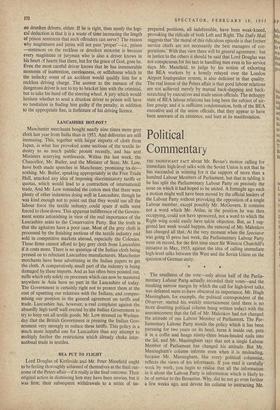LANCASHIRE HOT-POT ?
Manchester merchants bought nearly nine times more grey cloth last year from India than in 1953. And deliveries are still increasing. This, together with larger imports of cloth from Japan, is what has provoked some sections of the textile in- dustry to so much public protest recently, and has' sent Ministers scurrying northwards. Within the last week, the Chancellor, Mr. Butler, and the Minister of State,' Mr. Low, have both made speeches in Manchester, promising tae do— nothing. Mr. Butler, speaking appropriately in the Free Trade Hall, attacked any idea of imposing discriminatory tariffs or quotas, which would lead to a contraction of international trade. And Mr. Low reminded the cotton men that there were plenty of other industries doing well in Lancashire, though he was kind enough not to point out that they would use all the labour force the textile industry could spare if mills were forced to close down. This apparent indifference of the Govern- ment seems astonishing in view of the real importance of the Lancashire seats to the Conservative Party. But the truth is that the agitators have a poor case. Most of the grey cloth is processed by the finishing sections of the textile industry and sold in competitive markets abroad, especially the Colonies. These firms cannot afford to 12uy grey cloth from Lancashire if it costs more. There is no question of the Indian cloth being pressed on to reluctant Lancashire manufacturers. Manchester merchants have been advertising in the Indian papers to get the cloth. A comparatively small part of the industry is being damaged by these impo,rts. And as has often been pointed out, mills which rely solely on processes which can now be mastered anywhere in Asia have no part in the Lancashire of today. The Government is certainly right not to protect them at the cost of upsetting our relations with the Indians, and .compro- mising our position in the general agreement on tariffs and trade. Lancashire has, however, a real complaint against the absurdly high tariff wall erected by the Indian Government to try to keep out all textile goods. Mr. Low stressed on Wednes- day that the British Government is pressing the Indian Gov- ernment very strongly to reduce these tariffs. This policy is a much more hopeful one for Lancashire than any attempt to multiply further the restricti6ns whiCh already choke inter- national trade in textiles.










































 Previous page
Previous page